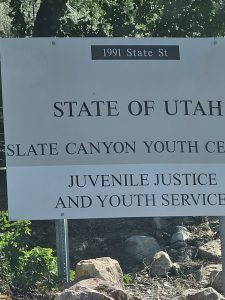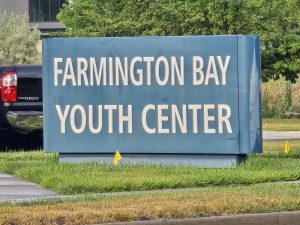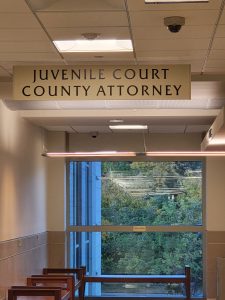




Utah has generally 3 levels of juvenile justice. Juvenile justice means how does Utah deal with juvenile crime.
(1). Juveniles Charged as Adults. This is really bad when you are charged as an adult when you are still a juvenile. This doesn’t happen very much and is reserved for the most serious crimes.
(2). Petitions for Juvenile Delinquency. This is the most common approach for serious juvenile crime but is still reserved for upper felonies and misdemeanors.
(3). Nonjudicial Adjustment. This article is about Nonjudicial adjustment, the lowest form of juvenile justice treatment. Nonjudicial adjustment covers most juvenile offenses and is an informal way to resolve problematic juvenile behavior.
In 2021 Utah moved the entire Juvenile Code to Title 80 of the Utah Code.
Nonjudicial adjustment is defined in the Utah Juvenile Code to mean:
“(60) “Nonjudicial adjustment” means closure of the case by the assigned juvenile probation officer, without an adjudication of the minor’s case under Section 80-6-701 [petition for delinquency or charged as an adult], upon the consent in writing of: (a) the assigned juvenile probation officer; and (b)(i) the minor; or (ii) the minor and the minor’s parent, guardian, or custodian.
The juvenile probation officer shall offer a nonjudicial adjustment to a minor if:
(i) the offense is a misdemeanor, infraction, or status offense;
(ii) the minor has no more than two prior adjudications [means charged as an adult or petition for delinquency]; and
(iii) the minor has no more than two prior unsuccessful nonjudicial adjustment attempts;
(iv) the offense the minor committed occurred prior to the minor being 12 years old.
(v) the minor is referred for being a habitual truant.

A juvenile probation officer SHALL NEVER offer nonjudicial adjustment for the following juvenile offenses:
Age 12 and Older When Offenses Occurred.
(A) Any section 502 DUI.
(B) Section 76-5-107, threat of violence;
(C) Section 76-5-107.1, threats against schools;
(D) Section 76-5-112, reckless endangerment creating a substantial risk of death or serious bodily injury;
(E) Section 76-5-206, negligent homicide;
(F) Section 76-9-702.1, sexual battery;
(G) Section 76-10-505.5, possession of a dangerous weapon, firearm, or short barreled shotgun on or about school premises;
(H) Section 76-10-506, threatening with or using a dangerous weapon in fight or quarrel;
(I) Section 76-10-507, possession of a deadly weapon with criminal intent; or
(J) Section 76-10-509.4, possession of a dangerous weapon by a minor; or Utah Code
Under 12 Years Old When Juvenile Offense Occured.
(i) Section 76-5-103, aggravated assault resulting in serious bodily injury to another;
(ii) Section 76-5-202, aggravated murder or attempted aggravated murder;
(iii) Section 76-5-203, murder or attempted murder;
(iv) Section 76-5-302, aggravated kidnapping;
(v) Section 76-5-405, aggravated sexual assault;
(vi) Section 76-6-103, aggravated arson;
(vii) Section 76-6-203, aggravated burglary;
(viii) Section 76-6-302, aggravated robbery; or
(ix) Section 76-10-508.1, felony discharge of a firearm.
Code section 80-6-304 details all possible nonjudicial adjustments terms. They are:
(a) pay a max fine of $250.
(b) pay restitution to any victim.
(c) complete community or compensatory service;
(d) attend counseling or treatment with an appropriate provider;
(e) attend substance abuse treatment or counseling;
(f) comply with specified restrictions on activities or associations;
(g) attend victim-offender mediation if requested by the victim; and
(h) comply with any other reasonable action that is in the interest of the minor, the community, or the victim.

Juvenile Court probation offices administer nonjudicial punishment without court intervention.
Surprisingly the Juvenile Court Probation Department administers nonjudicial adjustment in Utah. Interestingly, unlike adult court and adult probation, juvenile probation is a part of the Juvenile Court. Juvenile probation is not independent of the juvenile court like Adult Parole and Probation is.
What Happens at Nonjudicial Adjustment Hearings?
First. The Juvenile Court probation officer administers the hearing. The juvenile probation officer first lets the juvenile know about their right to an attorney and the right to turn down the nonjudicial adjustment and see a Utah Juvenile Judge.
Secondly, the Juvenile Court probation officer will likely administer mental health and suicide detection assessments to judge what the terms of probation should be. Higher scores or more problems with the diagnostic assessments can require stricter probationary terms.
Lastly, the probation officer determines the length of time and terms of the nonjudicial adjustment contract that the juvenile and parent signs.
The juvenile can be placed on informal probation or a higher level of probation based on the needs assessments and facts of the case. The nonjudical adjustment can stay open for months or just close after completing the terms.
Automatic Expungement After 10/01/2023. New is that certain types of nonjudicial adjustments are automatically expunged after the juvenile turns 18 years old. See Utah Code 80-6-1004.5.
Your nonjudicial adjustment is eligible for expungement under the following criteria:
(a) Waiting Period. the individual has reached 18 years old;
(b) Types Eligible for Auto Expungement. the individual’s juvenile record consists solely of nonjudicial adjustments;
(c) Successfully Completions. the individual has successfully completed each nonjudicial adjustment; and
(d) Timing. all nonjudicial adjustments were completed on or after October 1, 2023.
Waiting Periods. Waiting periods for other types of failed nonjudicial adjustments are set forth in Utah Code 80-6-1004.2. The criteria to expunge all other nonjudicial adjustments are:
(a) the individual’s juvenile record consists solely of nonjudicial adjustments;
(b) the individual’s juvenile record is not eligible for automatic expungement under Section 80-6-1004.5; and
(c) the individual has reached 18 years old.